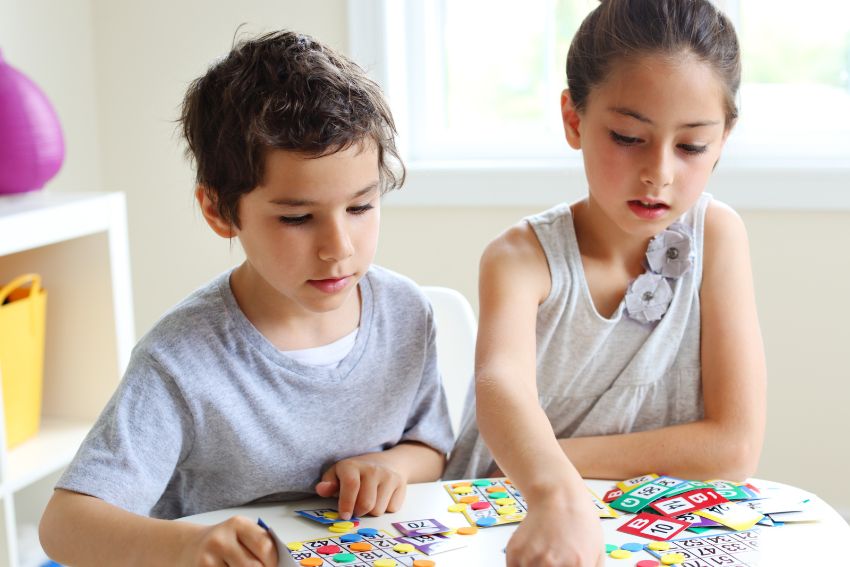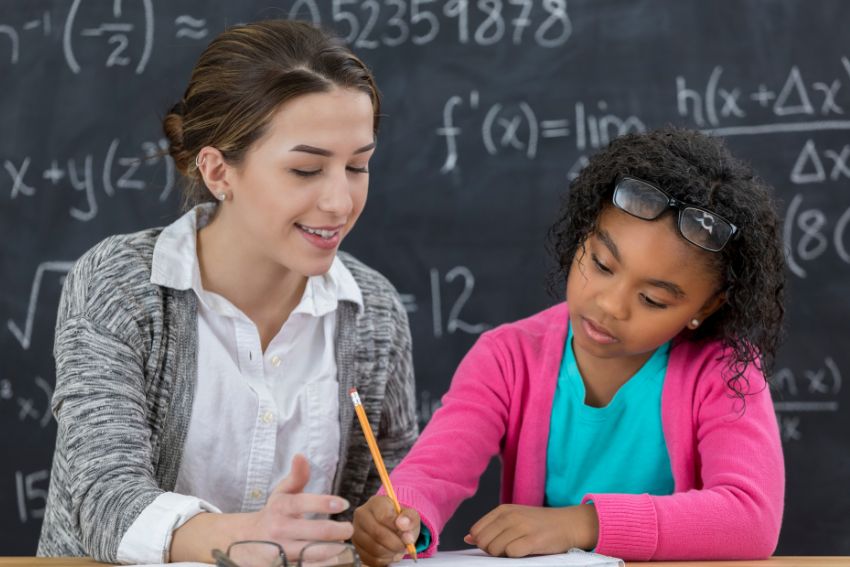As you already know Key Stage 2 is important stage for your child and you might be wondering what they’re learning and how you can support them. This stage, covering years 3 to 6, is where kids develop essential Key Stage 2 Maths skills.
Why is KS2 Maths so important? Maths builds logical thinking, and problem-solving skills, which is crucial for your child. It also prepares children for secondary school where maths plays a huge role. The better they understand maths now, the easier it will be later.
In this guide, we’ll walk you through everything you need to know about Key Stage 2 Maths. We’ll break down the curriculum, share useful worksheets, go over common maths questions, and offer practical tips to make learning easier.
Key Stage 2 Maths Curriculum
Let’s start with the Key Stage 2 Maths curriculum – since it covers Years 3 to 6, each year introduces more complex concepts that build on what was previously learned. By Year 6, they will be working with larger numbers, complex fractions, and algebraic reasoning, which sets them up for Key Stage 3 Maths.
What Does the KS2 Maths Curriculum Cover?
The Key Stage 2 Maths curriculum is divided into key areas, each focusing on these skills:
| Number and Place Value | Understanding numbers up to millions, rounding, ordering, and recognising patterns. |
| Addition & Subtraction | Using mental and written methods to solve problems quickly. |
| Multiplication & Division | Times tables up to 12x12, learning factors, multiples, and multi-step calculations. |
| Fractions, Decimals, and Percentages | Understanding how these concepts are connected and applying them in real-life situations. |
| Measurement | Working with length, weight, capacity, money, and time, helping children relate maths to daily activities. |
| Geometry | Identifying shapes, angles, and coordinates. |
| Statistics | Reading, interpreting, and creating charts, tables, and graphs to develop data analysis skills. |
The KS2 Maths curriculum helps children get better with numbers and problem-solving. It builds their confidence and prepares them for secondary school, making maths easier to use in everyday life.
Key Stage 2 Maths: What Your Child Learns Each Year
Now that we’ve covered the KS2 Maths curriculum, let’s look at how it progresses year by year. Each stage builds on the last, helping children develop stronger maths skills over time. Knowing what your child is learning at each stage can make it easier to support them at home.
Year 3: Building the Basics
- Introduction to formal written methods for addition and subtraction.
- Learning times tables for 3, 4, and 8 to strengthen multiplication and division skills.
- Recognising fractions and understanding how they relate to whole numbers.
- Measuring length, weight, and capacity using standard units.
Year 4: Strengthening Key Skills
- Mastering all times tables up to 12×12, an important milestone in KS2 Maths.
- Developing strategies for multiplication and division of larger numbers.
- Understanding decimals and fractions, including their equivalents.
- Exploring shapes, angles, and symmetry in geometry.

Year 5: Expanding Knowledge
- Working with larger numbers up to 1,000,000 and using negative numbers.
- Introducing percentages and their relationship with fractions and decimals.
- Calculating area, perimeter, and volume of different shapes.
- Reading and interpreting line graphs and data charts.
Year 6: Preparing for SATs and Secondary School
- Solving multi-step word problems using all four operations.
- Working with fractions, decimals, and percentages in more complex calculations.
- Understanding ratios and proportions and applying them to real-life problems.
- Getting ready for Year 6 SATs, focusing on reasoning and arithmetic skills.
Next, let’s explore how Key Stage 2 Maths worksheets can support learning at home.
Key Stage 2 Maths Revision, Worksheets and Past Papers
Now that we’ve covered the KS2 Maths curriculum, let’s talk about how children can revise and prepare for tests.
Key Stage 2 Maths Revision
Revision should be structured and less stressful. Regular practise reinforces learning and helps children feel prepared for tests. Short, focused study sessions work better than last-minute cramming. Helping your children to revise in small, manageable chunks makes learning more effective and less overwhelming for them.
One of the best ways to revise is by using flashcards and memory games. These can help with practising times tables, number bonds, and key maths facts in a fun and interactive way. Making maths part of everyday life also strengthens understanding. Some prefer written practise, while others learn better through interactive activities. Finding the right approach for your child can make a big difference in their progress.
Key Stage 2 Maths Past Papers and Worksheets
You must be wondering “Do KS2 students take formal exams?” for that – answer is only Year 6 students sit for the KS2 SATs (Standard Assessment Tests) in Maths and English, which assess their understanding before moving to secondary school. So, past papers are mainly useful for SATs preparation in Year 6.
For younger KS2 students (Years 3-5), past papers aren’t necessary, but practise worksheets and quizzes are a great way to get comfortable with different question formats.
Where to see key stage 2 worksheets? for example, BBC Bitesize is free interactive worksheets and quizzes covering KS2 Maths topics. Also, MathsWhizz offers you adaptive learning worksheets personalised to a child’s level.
As for KS2 SATs past papers for year 6 students: Gov.uk website provides you with official KS2 SATs papers from previous years. Like we already mentioned above – BBC Bitesize is also useful for past papers.
Common Key Stage 2 Maths Questions – How to Answer Them?
Since we got the idea about worksheets and past papers, let’s explore key stage 2 maths common questions and how to answer them – can be tests or homework.
What Types of KS2 Maths Questions Appear in Tests and Homework?
Here we will show you some of the examples of the questions:
Word Problems – Applying Maths to Real-Life Situations
Tom has £25. He buys a book for £7.50 and a toy for £9.25. How much money does he have left?
Answer: 25 – (7.50+9.25)=£8.25
Arithmetic Questions – Quick Calculations
What is 256 + 489?
Answer: 256+489=745
Fractions & Percentages – Converting and Solving
What is 20% of 150?
Answer: 150×0.2=30
Measurement – Working with Time
A train departs at 2:45 PM and takes 1 hour 35 minutes to reach its destination. What time does it arrive?
Answer: 4:20 PM.
Geometry – Finding Missing Angles
A triangle has angles of 50° and 60°. What is the missing angle?
Answer: 180−(50+60)=70°
Next, we’ll explore how KS2 maths assessments work and what parents need to know.
Key Stage 2 Maths Assessments: What Parents Need to Know
Assessments in Key Stage 2 Maths are designed to measure a child’s understanding and progress throughout Years 3 to 6. Schools use a mix of teacher evaluations, internal tests, and national assessments to track learning.

Types of KS2 Maths Assessments
Teacher Assessments (Years 3-6) – Teachers observe how children solve problems, explain their reasoning, and apply maths in classwork and homework. This ongoing assessment helps identify areas where extra support may be needed.
End of Year Tests (Years 3-5) – Some schools conduct formal maths tests at the end of each year to evaluate progress. These tests vary depending on the school but usually cover the key topics learned that year.
KS2 SATs (Year 6 Only) – The only standardised national assessment, taken in May, which tests maths and English.
What Happens in the KS2 SATs Maths Test?
The KS2 maths SATs consist of two parts. First part is: Arithmetic Paper and it assesses fluency with calculations, including fractions, decimals, and percentages. Next is, reasoning Papers (Two Papers) and it tests problem-solving skills through multi-step word problems.
While SATs are important for schools, they should not create unnecessary stress for children. They are simply a way to measure progress at the end of Key Stage 2.
Conclusion
Supporting your child during key stage 2 is not hard. All you have to do is help them with right resouces and provide with useful worksheets and past papers. With your right support they can improve their maths skills further.
If you’re searching for Key Stage 2 Maths online tutor, personalised one on one lessons can provide extra guidance and targeted support. As you may already know – every child learns at their own pace, so there is no need for rushing. Let them know that you are there and that is what matters the most. Good Luck!
You Might Also Find This Interesting








